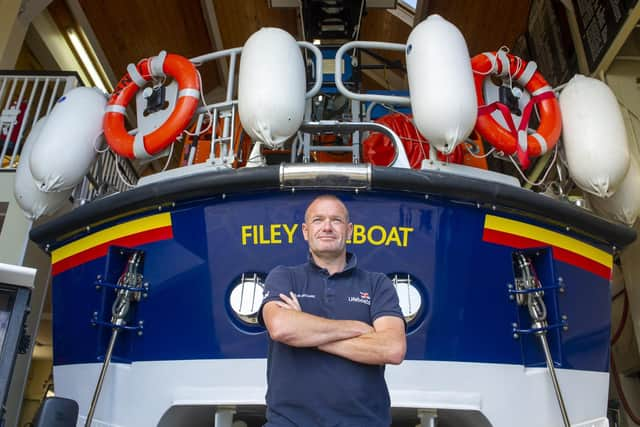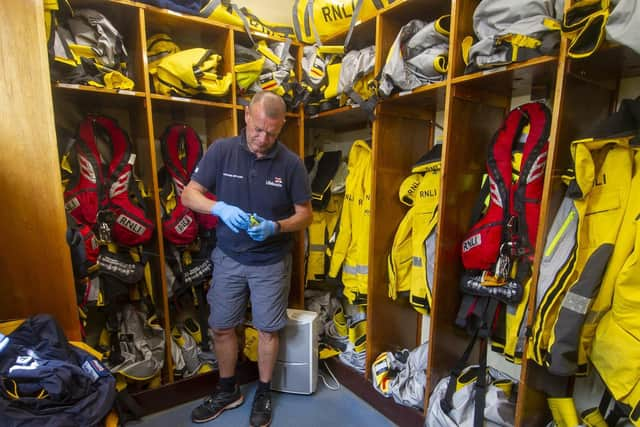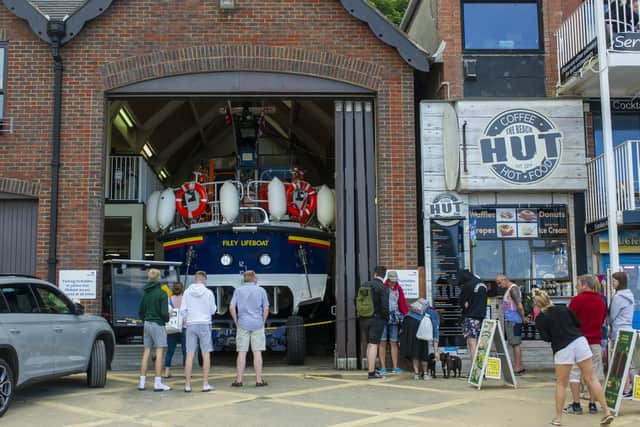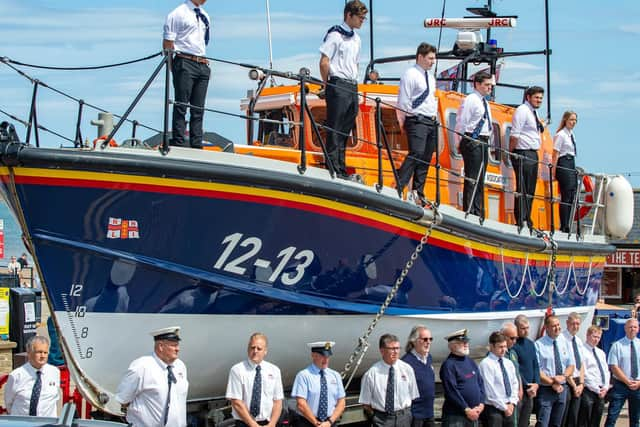How Filey's RNLI crew have coped with lockdown, tragedy and a staycation summer
The procession was for Lee Cowling, a lifelong RNLI crewman who collapsed and died suddenly at the age of 46 in June. Unable to attend the church service due to lockdown restrictions, the people of Filey turned out to say their final farewell to a man they looked on as a son and a brother to all.
The local reaction to Lee's death was telling, and a poignant throwback to more dangerous days when tragedies at sea would unite what was then a predominantly fishing community. Today, the lifeboat station is still very much embedded in Filey life, and those whose forebears manned the trawlers still gravitate towards it.
Advertisement
Hide AdAdvertisement
Hide AdUnlike many voluntary organisations, the RNLI has few problems recruiting new blood - indeed, local teenagers line up to graduate from Filey Sea Cadets and join the station at 18. Generations serve alongside each other - fathers and sons and, more recently, daughters too. The RNLI have run the station since 1852, and at one point in the 19th century, the Filey boat saved more lives than any other crew in England.


Lee's was not the only tragic passing to have hit the station in what must be one of the most challenging years in its history. In January, long-serving mechanic and navigator Pete Macauley died from an 'aggressive' illness at 62, and just last month 23-year-old former crewman Luke Burton, whose father Brett still serves, was killed in a motorcycle accident.
The close-knit volunteers have had to deal with the loss of their colleagues while facing lockdown, a pandemic, a suddenly busy staycation summer and attending 'shouts' - parlance for incidents - while wearing full PPE. They've even attempted to rescue a shark that had beached in Filey Bay.
Neil Cammish is the fifth generation of his family to have gone to sea. Nearly 30 years ago, the young fisherman was told it was 'about time' he followed local tradition by joining the lfieboat, and he's been there ever since - the past two years as a full-time mechanic and coxswain.
Advertisement
Hide AdAdvertisement
Hide AdHe's keen to point out that despite the long association and kinship with the fishing industry, the crew has always included non-fishermen, and as trawling has declined, most of the volunteers' day jobs are in the North Sea energy sector, or in merchant shipping. Others, like the late Pete Macauley, work for the Humber Coastguard.


The growth of tourism on the Yorkshire coast is also reflected in the crew's make-up - the tractor driver also owns the ice cream shop.
"The Sea Cadets are still a common pathway in - we've got two brothers, 18 and 19, who have just joined from there. We've never all been fishermen. Dave, the second coxswain, is a plumber, and we've got guys who are in the Merchant Navy and working on the wind farms and the rigs.
"There are plenty of younger people, we're very lucky there. They tend to stay as well, and we have plenty of crew who've done more than 10 or 20 years here. Dave's done 30; it's a really good mix. We've got Katie and Joe, who are just 18, and Joe's dad Mark, who's a policeman in Scarborough, serves too. The Frampton brothers' dad and grandad were both Whitby fishermen, and we get a few from the yacht clubs. There are always people who want to be out at sea.
Advertisement
Hide AdAdvertisement
Hide Ad"Paul owns the ice cream shop, we've got a builder in the crew too. Plenty of them work locally, but the ones who go away offshore will be home for two months and be on call then. It all falls into place."


The nature of call-outs and sea rescues has changed over the years, and Neil believes that safety messages promoted by the RNLI's social media channels - each station has its own Facebook page, usually run by the crew - have helped to reach a wider audience. These posts - uploaded after incidents have concluded - are candid and detailed, with a refreshing lack of technical jargon that allows followers to connect with the volunteers.
"We still get called to people cut off by the tide and dogs that have fallen off cliffs, but not as many as we used to. Kids don't really use dinghies as much nowadays either - we got far more calls years ago to people who had been swept out to sea in them. We have the lifeguard patrols now, so we notice things more quickly and can use the tannoy to warn people on the beach.
"The jobs have changed, and the inshore lifeboat isn't as busy any more."
Advertisement
Hide AdAdvertisement
Hide AdOver 1,800 schoolchildren visited the station last year, and the RNLI also works with beach shops to discourage the sale of dangerous inflatables to families.


"I just think people are more responsible and aware, and with the social media posts they see what the risks are."
Rip tides are one of the hidden dangers that lurk off the Yorkshire coast - Neil remembers in the summer of 2019, attending seven calls in the space of a week to swimmers who had been dragged out to sea near the Reighton Sands holiday park.
"They are local phenomenons. The surfers are often more experienced and can deal with them, but we get holidaymakers caught in the currents.
Advertisement
Hide AdAdvertisement
Hide Ad"Calls to missing children in the water are very scary, but we are all trained for these scenarios and we have the right mindset."
Many of the incidents further out to sea involve breakdowns of fishing vessels and leisure boats that need to be towed back to shore.
"The safety regulations in commercial fishing are more stringent now, so the sailors are more prepared and have to do checks. We gets things like broken gearboxes and fouled propellers.
"I remember being sent out to a boat with a broken water pump in January, 25 miles out to sea in an easterly gale at 3am!
Advertisement
Hide AdAdvertisement
Hide Ad"There are a lot more kayakers now, and you get some that set off wearing just a pair of shorts, set up for a worst-case scenario!"
Lockdown was 'quiet' in Filey, but shouts have picked up since the green light was given for staycations, and Yorkshire's beaches have been inundated with visitors.
"There were a lot of challenges, and it was a bit of a balancing act, Things like fundraising, training and morale were all affected - it was a case of keeping people together, but we've come out the other end. We've got back into the rhythm of boat maintenance now.
"Filey was very quiet - just the odd boat out at sea - but after lockdown we had seven or eight jobs in two weeks. That's lifeboating for you. We said it could go either way - it could be normal for the rest of the summer, or total carnage."
Advertisement
Hide AdAdvertisement
Hide AdTheir colleagues at Scarborough have already rescued a 10-year-old boy who had been blown out to sea and drifted the entire length of South Bay, while a family of paddleboarders were also swept out of Cayton Bay this week. At the Skipsea Sands holiday park, two people were seriously injured in cliff falls - the second while watching the first being rescued.
"There is great camaraderie here; we are a close-knit team. Losing Pete and Lee hit us hard; I had fished with Lee. It's been a tough, eventful year."
Filey station faced another setback during lockdown, when they heard that the delivery of their new Atlantic 85 lifeboat had been postponed for up to two years. Their current Mersey class vessel is nearly 30 years old.
"We need to upgrade the boat really - the technology hasn't changed much in 30 years, and we need to bring it into line with Scarborough and Bridlington, which both have new Shannon boats. The Atlantic 85 is a younger person's boat, and the upper age limit for crew on it will be lower.
Advertisement
Hide AdAdvertisement
Hide Ad"Some of our guys will have to retire, but they will still drive the tractor."
Reflecting on the station's future and 30 years on deck, Neil believes Filey's team are in a strong place having emerged from recent adversity.
Perhaps the only parallel can be found back in 1860, when a freak hurricane destroyed the boats and nets belonging to the fishermen who also manned the early lifeboat. A local doctor wrote to The Times, imploring its wealthy readers to raise funds for replacements. Then as now, the lifeboatmen looked after the people of Filey, and in turn the people of Filey looked after the crew.
"It's an exciting time, with all the new training for the Atlantic 85 vessel, and the station is very busy.
"You don't look back at the bad rescues, the ones that ended in tragedy. This role is always rewarding and very worthwhile.
"The sea can be a cruel place."
Comment Guidelines
National World encourages reader discussion on our stories. User feedback, insights and back-and-forth exchanges add a rich layer of context to reporting. Please review our Community Guidelines before commenting.